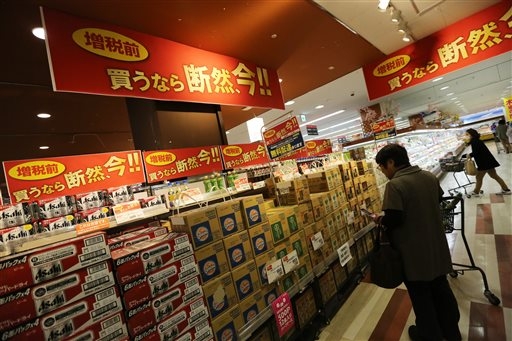
TOKYO (AP) — Japan raised its sales tax Tuesday, moving to stabilize government finances but at the risk of undermining a shaky economic recovery.
It's a gamble the world's No. 3 economy cannot afford to take, given its soaring public debt.
Economists expect the sales tax hike, to 8 percent from 5 percent, to slow but not derail the recovery. It is the first such increase since 1997, when the combination of the tax hike, an unwinding of debt from Japan's bubble economy days and the impact of a regional financial crisis plunged the country into recession.
But recent data suggest the recovery may be less solid than Prime Minister Shinzo Abe had hoped for when he agreed to raise the tax last fall.
A quarterly central bank survey of Japan's major manufacturers released Tuesday, the "tankan," showed business confidence rose slightly, but was well below forecasts. The outlook for coming months was less rosy, with many companies worried over a consumer backlash following the tax hike.
The 'Abenomics' economic strategy aims to spur inflation and pull Japan out of its two-decade economic slump by getting consumers and businesses to make purchases sooner rather than later. But so far wages have not risen, and the rising cost of living seems to be triggering still more belt-tightening.
Abe has promised 5 trillion yen ($48 billion) in fresh stimulus for the economy, and still more if the tax hike proves a harsher blow than the government expects. In theory, rising consumer demand should help push wages higher, especially given the shrinking of Japan's labor force as its population falls and ages. But while some major manufacturers have raised wages slightly, employers overall have instead increased overtime work and hiring of part-time workers.
"Japan's consumers continue to face severe headwinds as strong employment gains remain insufficient to compensate for falling real wages," Marcel Thieliant of Capital Economics said in a report Tuesday.
While some better-off Japanese have splashed out on luxury goods and vehicles, most consumers remain wary.
Housewife Kyoko Takahashi, 77, doing her daily shopping in the vegetable section of a supermarket in Urayasu, a Tokyo suburb, believes buying ahead wouldn't result in much of a saving overall.
"Besides, I could end up buying something which I don't need," she said.
Ahead of Tuesday's hike, Japanese television networks and newspapers ran features about which products to buy in advance, generally big ticket items where the cost increase will pinch most. The consensus: hoarding relatively cheap daily necessities such as toilet paper and soy sauce makes little sense for typically cramped homes with limited storage space.
The tax hike is needed to help cover soaring costs for pensions and health care as well as massive government stimulus spending meant to force the economy out of the doldrums. Japan's gross public debt is more than 1 quadrillion yen (about $10 trillion), or nearly 250 percent of gross domestic product.
"I have to ask citizens to accept this hike," Abe said Tuesday. "It is for the sake of the country."
While household spending fell 1.5 percent in February, it likely rebounded in March on a rush of last-minute buying, said Junko Nishioka, an economist at RBS Japan Securities. She points to rising corporate capital investment and higher prices for durable goods such as televisions as signs the economy is on the right track.
"The government is providing lots of supporting measures for the corporate sector such as tax breaks for companies that increase corporate capital spending. Conditions are quite easy for companies to spend their money," she said.
Still, the tankan survey showed big companies plan to raise capital spending by a mere 0.1 percent in the fiscal year that began Tuesday.
A sustained slowdown in economic growth would make it difficult for the government to go ahead with another increase to the sales tax in 2015. The second increase would raise the sales tax to 10 percent and is crucial to fixing public finances.
Apart from the tax hike, prices are rising, though at a slower pace than expected. With inflation at 1.3 percent, short of the official 2 percent target, expectations are rising that the central bank may expand its monetary stimulus further to help cushion the tax hike's blow to growth.
Manufacturers and other companies are taking the opportunity to raise prices on many products and services, from subway tickets and vending machine drinks to school fees and haircuts.
None of this is welcome news for consumers, especially the majority of workers who have yet to see any significant increases in take-home pay and seniors living on fixed incomes.
"Well, there is no choice. So, I have to accept it. But, it would be good if the tax could stay at 5 percent," said retiree Shinichi Ogawa, as he looked over a shelf of fresh spinach.
Kozo Shibamura, general manager at a Daiei supermarket, said sales at his outlet are up 20 percent from a year earlier. He agrees with economists such as Nishioka, who are forecasting the economy will contract a bit before bouncing back in the summer.
"I think the tax hike could affect sales for about two months at the beginning. Then, we think it will return to normal," Shibamura said.